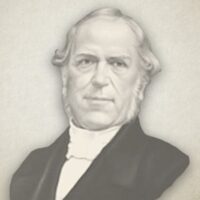
33 Use Of The Word “World”
`For God sent not his Son into the world to condemn the world, but that the world through him might be saved,’ John 3:17. `And the bread that I will give is my flesh, which I will give for the life of the world,’ John 6:5. `And he is the propitiation for our sins, and not for ours only, but for the sins of the whole world,’ 1 John 2:2. These portions of sacred truth, from the use of the words world, and the whole world, are considered to involve an evident universal intention and consequent universal virtue, provisionally, if not determinately, in the redemption work of Christ. But while God in the Trinity of his persons is as mighty to save as he is willing to save, and saving being the sole act of his own good will and pleasure, and the saving display and conduct of his power having been in all ages discriminate only, I cannot take any text to mean any thing of individual universality of intention, provision, or virtue, in the redemption work of Christ; while, notwithstanding, every text and every sound has a meaning harmonious in the perfect whole.
It is well known that the Gentiles are called the world, in distinction from the Jews, and such passages as the above are intended to declare the Gentiles equally included with the Jews in the redemption work and salvation of our Lord Jesus Christ. The Jewish notions and prejudices generally, as a body, were that they exclusively were to partake of the benefits of Messiah’s work, and be of his kingdom; and these sayings of the world, in relation to the redemption work of our Lord Jesus Christ, are intended to destroy all such notions, and to declare that with God there is no difference of national distinction, in the great matters and designs of Calvary. And while some of the Jews, from their own prophets, held that the Gentiles should partake, yet this was but a partial notion, and that such favors were only to be extended to such nations of the Gentiles as were distantly related to them, (the Jews,) by the blood of their forefathers, and to such as had been most friendly towards them, or who had done them any kindness as a people; so that the favor was to be for their sakes only, and so applying Deut ii; while all the rest of the Gentile nations should be destroyed. And the words, `every creature,’ `all nations,’ `the whole world,’ `all men every where,’ are beyond a doubt, in my opinion, used to contradict and destroy every thing of this notion, and to declare that, by the will of God, without any such secondary cause or reason, redemption and salvation eternal should extend to every nation under heaven equally, as to the Jews in due order and time. But this does not declare the redemption word of Christ to be in any thing individually universal, nor any thing beyond the election of grace, of all nations, kingdoms, kindred, tongues, and people; any more than the apostle’s speaking so much of the manhood of Christ to the Jews, in the beginning of the gospel ministry, for the establishment of the fact of his being in truth the promised seed of Abraham, and son of David, according to the flesh, was any denial of his proper divinity, as the Unitarians would have us to believe.
John Foreman (1792-1872) was a Strict and Particular Baptist preacher. He was appointed the Pastor of Hill Street Chapel, Marylebone, serving this position for close to forty years.
JOHN FOREMAN'S LIFE AND MINISTRY
JOHN FOREMAN ON DUTY FAITH (COMPLETE)
JOHN FOREMAN'S BAPTISM AND COMMUNION CONSIDERED (COMPLETE)




